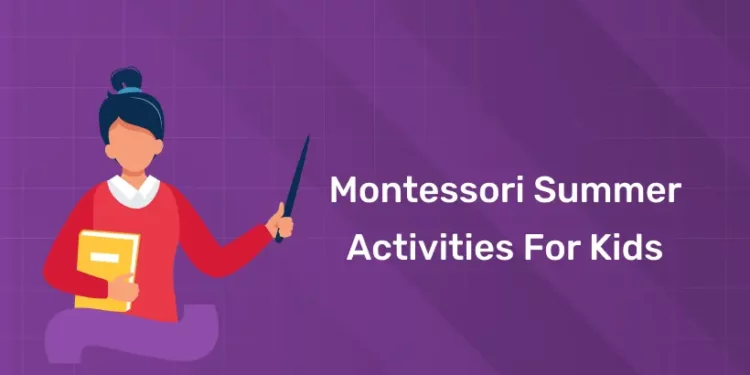Table of Contents
Summer is the perfect time to explore new ways of learning, and Montessori-inspired activities provide an ideal blend of fun and education for kids. Rooted in the principles of independence, curiosity, and hands-on learning, these activities allow children to engage with their environment in meaningful ways. Whether it’s through outdoor adventures, creative projects, or practical life tasks, Montessori summer activities encourage kids to develop essential skills while enjoying their break from school. In this blog, we’ll explore a variety of engaging and enriching activities that will keep your children active, curious, and eager to learn throughout the summer months.
Register for the Entri Elevate Montessori Teacher Training Program! Click here to join!
Introduction
Preschool-aged children have begun laying the groundwork for their personalities and skill sets by the time they walk into a Montessori classroom. At this point, a certified Montessori teacher takes the lead in establishing a setting where a group of students of various ages can keep growing and enhancing their skills. With resources and activities that focus on social skills, language and literacy development, mathematical ideas, and more, this setting is designed to encourage self-directed learning.
The Montessori method’s child-centered philosophy provides the framework for learning through hands-on experiences, object manipulation, and unstructured investigation. They have the liberty to pursue their passions, select their pursuits, enhance their focus and attentiveness, and participate at their own speed.
What is the Montessori Method?
The Montessori method is an educational strategy that supports children’s growth in the four developmental areas of early childhood education: cognitive, language, social-emotional, and physical. Children are guided through self-directed and self-motivated learning, activities, and play. Maria Montessori, an Italian physician and educator, is credited with creating it. Having studied human development from conception to maturity, she created the whole child approach, which supports childhood development by providing children with the framework and resources they require for success both within and outside of the classroom.
The Montessori approach aims to lay a solid foundation for children so they can grow into driven, self-directed learners who, as they pursue further education and growth, will eventually become successful adults. Preschoolers may be able to gain independence, become more confident in their abilities, and establish trust in the world by being in a safe, stimulating, and caring environment like a Montessori classroom.
Principles of the Montessori Method
The five fundamental principle upon which Maria Montessori based the Montessori technique were her training as a physician and teacher:
- Principle 1: Respect for the child
- Principle 2: The absorbent mind
- Principle 3: Sensitive periods
- Principle 4: The prepared environment
- Principle 5: Auto-education
Principle 1: Respect for the child
The Montessori approach places a strong emphasis on honoring kids’ learning processes. Each child is unique and has needs, talents, shortcomings, and impairments. Respect for the child places a higher priority on kids and calls on teachers to ease off from giving them strict instructions. Rather, the Montessori approach asks teachers to respect the kid by allowing them to make their own decisions about how they want to learn. Respect is demonstrated by not interfering with their task or focus. Montessori education demonstrates that children should be respected and given the freedom to flourish on their own, which challenges the way that some people view established educational norms.
Principle 2: The absorbent mind
Little ones have “absorbent minds.” Children’s rapid and effortless assimilation of information from their surroundings is made possible by their high levels of cerebral activity from birth until preschool age. Think about how simple it appears for young children to acquire numerous languages at the same time. Their inquisitive minds continually aid in their learning just by virtue of existing and experiencing.
Principle 3: Sensitive periods
Sensitive periods are defined as particular developmental phases when kids are open to learning a particular skill or aptitude. They are especially responsive to events and information that support the growth of that talent. For instance, there are times when kids are sensitive to counting or language acquisition. Every youngster experiences sensitive phases in a different order and at a different time. In order to recognize sensitive times and set up the environment to suit the requirements of the kids, Montessori teachers are trained to observe the kids.
Principle 4: The prepared environment
Children go through several developmental stages in their early years. Their demands shift as they pass through various phases. The teacher in a Montessori classroom is in charge of setting up “the prepared environment.” They accomplish this by carefully choosing and setting up the resources in a logical sequence to suit the kids’ developmental needs. By setting up the classroom such that a kid can work independently, Montessori teachers can support a child’s development and capacity to move forward at their own speed.
Principle 5: Auto-education
According to Montessori’s auto-education theory, children learn best when given the freedom to solve problems on their own. Children learn on their own, but teachers offer direction, support, and the right atmosphere.
Register for the Entri Elevate Montessori Teacher Training Program! Click here to join!
Montessori Summer Activities for Kids
1: What is the primary focus of the first plane of development in the Montessori method?
Summer is a fantastic time for children to embark on exciting adventures and connect with the world around them. As parents and caregivers, we have a special chance to introduce Montessori-inspired activities that promote independence and a genuine love for learning for your children from toddler to aged. In our toddler and elementary programs at Montessori House for Children and Elementary School, we focus on a child-centered approach that nurtures their curiosity through exciting outdoor explorations.
1. Do Water Play Activity
For toddlers and above, playing in the water is a favorite summertime pastime. Water play is a favorite activity for kids of all ages! Provide buckets, mugs, and other containers for a makeshift outside water station. Your youngster will learn focus and fine motor skills by pouring and transferring water. Let them experiment. To improve the sensory experience, add some water-safe toys or floating objects. Keep a tight eye on your youngster and allow them to explore the benefits of water while providing relief from the summer heat.
2. Gardening
Gardening with kids teaches them patience and responsibility in addition to introducing them to the beauty of nature. Just like they do at school, your children—from toddlers to 12-year-olds—will love gardening at home. Give them gardening equipment that are appropriate for their size, then let them to water and plant seeds and watch them grow.
Urge children to experience the wonders of nature by letting them touch the earth, smell the flowers, and so on. In addition to improving their motor skills and strengthening their bond with nature, gardening helps children develop a feeling of responsibility and concern for the environment.
3. Work Around the House
Helping around the house is another Montessori-inspired activity you can do with your kids this summer. Practical life skills are a cornerstone of Montessori education, and we stress their importance even for toddlers. Summer is a great time to get your kids involved in basic household chores, like setting the table, wiping spills, or folding laundry (small items like washcloths).
These activities encourage independence, coordination, and a sense of responsibility, and even though it might take longer to finish tasks with their assistance, the confidence and sense of accomplishment they receive will be priceless.
4. Inviting the Toddler to Help in the Kitchen
Life skills education is a key component of the Montessori Method. Probably loves to help in the kitchen, just like most kids do. For the next two months, he will be home more often than normal, so I have a lot of baking and culinary tasks planned with him.
Our learning tower is one piece of toddler gear that has greatly increased the possibility of helping in the kitchen. He can mix and scoop to his heart’s content while remaining safely at counter level thanks to it. Our future is full with spaghetti salads, flatbread pizzas, and fast breads.
5. Setting Up Montessori-Style Spaces Indoors
The value of order is one thing I took away from reading The Montessori Toddler. It may surprise you to learn that toddlers actually prefer order and chaos than neat environments that are too big for their little hands and frames. The theory goes that if kids’ play settings are tidy and welcoming, they will be more successful playing on their own.
6. Adding a Toy Shelf to the primary living Space
You should choose to place a small toy shelf in the living room, where we spend most of our time as a family, after understanding that it was pointless to try to store all of the toys in our children’s bedrooms. We came onto a tiny toy shelf, which you make an effort to arrange in a Montessori-style manner, with one toy or activity per cubby. The book recommends, if at all feasible, placing each individual toy on a tray.
7. Creating a low-mess Craft Station
To provide access to art supplies all the time, you recently set up a little craft station for them in addition to the toy shelf. You never again concerned about drawings appearing on your walls or furnishings thanks to Crayola Color Wonder markers and paper. Accessible and hospitable, the table and chair are both toddler-sized. Referring back to the shoe box trays from earlier, should discovered that after you arranged the paper and markers into individual containers, the toddler was able to color for longer.
8. Toddler-Friendly “Chores”
The development of responsibility is one of the tenets of the Montessori Method. The theory is that children are inherently nurturing creatures and flourish when entrusted with tasks involving the upkeep of their surroundings, belongings, and self. You have look for methods to involve them in maintaining your house, both inside and out, ever since they was a little child.
They can handle a little bit more of that duty now that he is a little older. We’re putting him to work on the following Montessori projects this summer:
- Every morning, feed the dogs and let them outside.
- Place his soiled clothes in his own hamper—one of his favorite things to do.
- Assist in filling the washing machine.
- Our kitchen floor, cleaned using the Swiffer WetJet.
- utilizing a watering can the size of a toddler to irrigate the flowers.
9. Promoting Individuality Whenever It Is Possible
In addition to asking him to assist with different “chores” around the house, I also support my son’s independence by letting him handle everyday tasks on his own. For instance, I give him several minutes to clean his own teeth before intervening to make sure the task is done correctly. He enjoys getting out his step stool and experimenting in front of the mirror. Along with letting him pick the clothes he wants to wear every day, my husband and I also urge him to wear his own sneakers when we leave the house.
10. Bringing About the Rich Experiences
The importance that enriched experiences can offer is another lesson that the Montessori Method imparts. Put another way, allowing youngsters to stray from their typical routine and experience new things can help them think more broadly and foster an exploration-loving attitude.My spouse and I have arranged many summertime activities, such as zoo excursions, library visits, a beach vacation in New England, and visits to my in-laws’ lavender farm, where my kid has a particular attachment to one of their “Babydoll” sheep.
Register for the Entri Elevate Montessori Teacher Training Program! Click here to join!
Get Certified & Start Your Montessori Career
Montessori Teacher Training Course by Entri App: Gain expert skills, earn certification, and kickstart your teaching career.
Join Now!Frequently Asked Questions
What is the Montessori method of teaching?
Which activities help kids learn the most, according to Montessori?
The Elementary curriculum, like all Montessori levels, is predicated on the idea that children learn best when they move and use their hands. It offers them the cognitive, social, and emotional support they need to realize their full potential.











